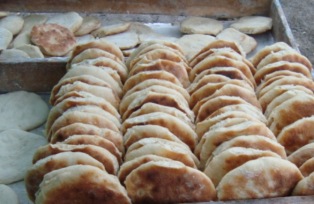Bread shortages hit Sudan as president annuls decision to lift wheat subsidies
July 9, 2012 (KHARTOUM) – Various parts of Sudan’s capital Khartoum and other regional towns are beginning to witness shortages of bread coupled with exorbitant price increases, in the latest manifestation of a growing economic crisis.
 Sudan’s economy has been grappling with soaring inflation, which hit 30 percent in May, and a depreciating currency since the country lost three quarters of its oil production to South Sudan when the latter seceded in July last year.
Sudan’s economy has been grappling with soaring inflation, which hit 30 percent in May, and a depreciating currency since the country lost three quarters of its oil production to South Sudan when the latter seceded in July last year.
Worsening economic conditions sparked a wave of street protests that has been gripping the capital and other regional towns for the last three weeks.
Citizens interviewed by Sudan Tribune in Khartoum complained that the price of bread and many other food commodities has gone up in the last few days. They also said they had to stand in long queues on Monday to buy bread. Bread is an essential part of standard Sudanese meals.
Meanwhile, local newspapers reported on Tuesday that President Omar Hassan Al-Bashir reversed a resolution by the minister of finance, Ali Mahmood Abdel-Rasool, to lift wheat subsidies by increasing the price of one ton of wheat from $2,800 to $4,400.
Sudan’s protests were originally sparked by the government’s decision to lift subsidies of a number of commodities including fuel and sugar as part of tough austerity measures officials say are required to make up for a budget deficit of $2.4 billion.
Police and security authorities have so far managed to contain the protests using teargas, rubber bullets and sweeping arrests.
Activist groups say more than 2,000 people have been arrested since the protests began on 16 June.
The ruling National Congress Party (NCP) attributes the economic crisis exclusively to the loss of oil income when South Sudan seceded taking with 75% of production.
Opponents of the NCP, however, point to rampant corruption and overspending on defense and security as to the real cause of the economic crisis.
(ST)
